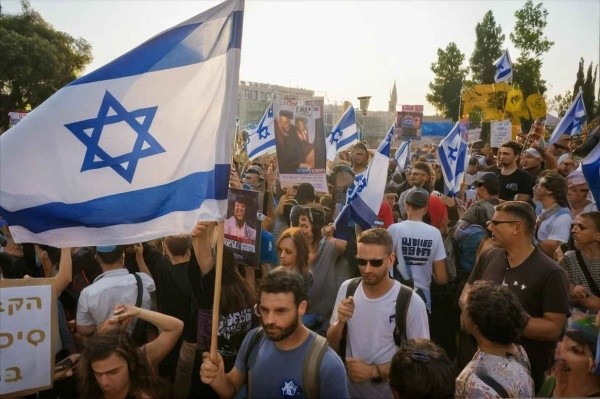Iran’s Plan to Strike Back Against the U.S.
Iran’s Military Preparations Following U.S. Attacks
Loading...

Angry demonstrators stage mass protests demanding ceasefire deal as Israel’s largest trade union calls for a general strike on Monday.
Public Outcry and Demonstrations
In a powerful display of anger and grief, tens of thousands of Israelis took to the streets on Sunday night, demanding a ceasefire deal with Hamas after the tragic discovery of six hostages' bodies in Gaza. This marked one of the largest anti-government protests since the onset of the Gaza conflict nearly 11 months ago. Demonstrators chanted “Now! Now!” as they called for Prime Minister Benjamin Netanyahu to take immediate action to secure the release of the remaining captives.
The protests saw significant unrest, with reports of scuffles between demonstrators and security forces. Many protesters blocked major roads in Tel Aviv and gathered outside Netanyahu's office in West Jerusalem, expressing their frustration over the government's handling of the hostage situation. The Hostages and Missing Families Forum, representing families of those still held captive, issued a statement blaming Netanyahu for the deaths, asserting that the hostages were “murdered” after enduring nearly a year of abuse and starvation in Hamas captivity.
Union Response and General Strike
In response to the escalating public outrage, Israel's largest trade union federation, the Histadrut, announced a general strike set to begin on Monday. This strike, the first since October 7, aims to pressure the government into negotiating a ceasefire deal. Histadrut chief Arnon Bar-David emphasized the urgency of the situation, stating, “A deal is more important than anything else. We are getting body bags instead of a deal.” The strike is expected to disrupt major sectors of the economy, including banking, healthcare, and transportation, with Ben Gurion Airport closing its doors from 8 AM (05:00 GMT) on Monday.
The call for a strike has garnered support from various sectors, including manufacturers and entrepreneurs in the high-tech industry, reflecting widespread discontent over the government's failure to secure the safe return of hostages. Ron Tomer, head of the Manufacturers Association of Israel, criticized the government for neglecting its “moral duty” to bring the captives home, stating that without their return, the country cannot hope to heal or recover economically.
Political Tensions and Calls for Action
The political landscape in Israel is fraught with tension as opposition leaders, including former Prime Minister Yair Lapid, voiced their support for the strike and the protesters' demands. However, Finance Minister Bezalel Smotrich has sought to block the strike, arguing that it lacks legal grounds and could cause unnecessary economic damage during wartime.
The situation remains dire, with the Israeli military reporting that at least 101 hostages are still unaccounted for in Gaza, including 35 believed to have died during their captivity. The military has acknowledged the challenges of rescuing the remaining captives, indicating that only a negotiated deal could facilitate their return.
Conclusion
As protests continue to grow in intensity, the Israeli public's demand for a ceasefire and the safe return of hostages has reached a critical juncture. The combination of mass demonstrations and a general strike reflects a society grappling with grief and frustration over the ongoing conflict. With the government facing mounting pressure from both the public and labor unions, the coming days may prove pivotal in determining the future of negotiations with Hamas and the fate of the remaining captives.
Editor
Iran’s Military Preparations Following U.S. Attacks
Troops remain in five strategic locations, raising fears of renewed tensions and long-term occupation.
Opposition forces have taken control of the capital after a significant offensive. Here is how it unravelled.
